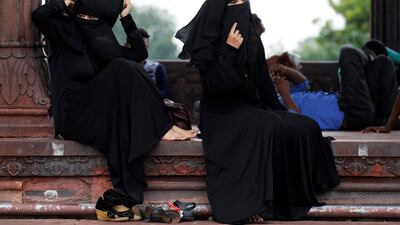India’s top court has sought a response from the government to petitions seeking to declare several Muslim religious practices, including polygamy and nikah halala, as unconstitutional.
The Supreme Court is also seeking to make bigamy an offence for all religions.
Hindu-majority India, officially a secular country, allows all religious communities to follow their own laws on marriage, divorce and property.
Muslim men, as per the Sharia, or Muslim Personal Law, are allowed to have as many as four wives at the same time.
Nikah halala is a process in which a woman has to marry another person, have the marriage consummated, and then divorce him to remarry her first husband.
Bigamy and polygamy are punishable offences, carrying a seven-year jail term for members of other communities since 1950s.
While there are no recent data available on polygamy, government figures from the 1960s found that such practices were more prevalent among India's tribal communities, Buddhists and Hindus, with Muslims being the least polygamous.
Government data from 2006 suggested that Buddhists topped the polygamy practice, followed by Muslims, Christians and Hindus.
'Insecure, vulnerable'
The top court on Tuesday heard eight petitions filed by three Muslim women, advocates and an NGO called Women Resistance Committee.
The petitions challenged the practices that “render Muslim wives extremely insecure, vulnerable and infringe their fundamental rights”.
“Muslim law, [permitting] more than one wife at a time, is against the very spirit of the constitution as it discriminates on the basis of gender and there is no valid reason for continuing polygamy or bigamy in the national interest,” one petition said.
A five-judge bench has sought a reply from the government, the National Human Rights Commission, the National Commission for Women and the National Commission for Minorities on the constitutional validity of the practices.
It has set the next hearing for October, after the Hindu festival of Dussehra.
Triple talaq
The petitions were filed after the landmark judgment by the top court declaring the practice of triple talaq — the instant divorce in Islam — unconstitutional in 2017.
The court in its judgment had said the practice of instant divorce by uttering “talaq” three times was against the basic tenets of Holy Quran.
It had further referred the pleas challenging the constitutional validity of polygamy and nikah halala to a larger bench in 2018.
However, several Muslim organisations, including Jamiat-Ulama-i-Hind, the leading organisation of Islamic scholars in India, have argued that the practices cannot be invalidated as the Indian constitution does not interfere with religious practices.
Muslim laws have come under increased scrutiny since Prime Minister Narendra Modi’s Hindu nationalist Bharatiya Janata Party came to power in 2014 and started advocating the cancellation of personal laws and the introduction of a uniform law for the country.


